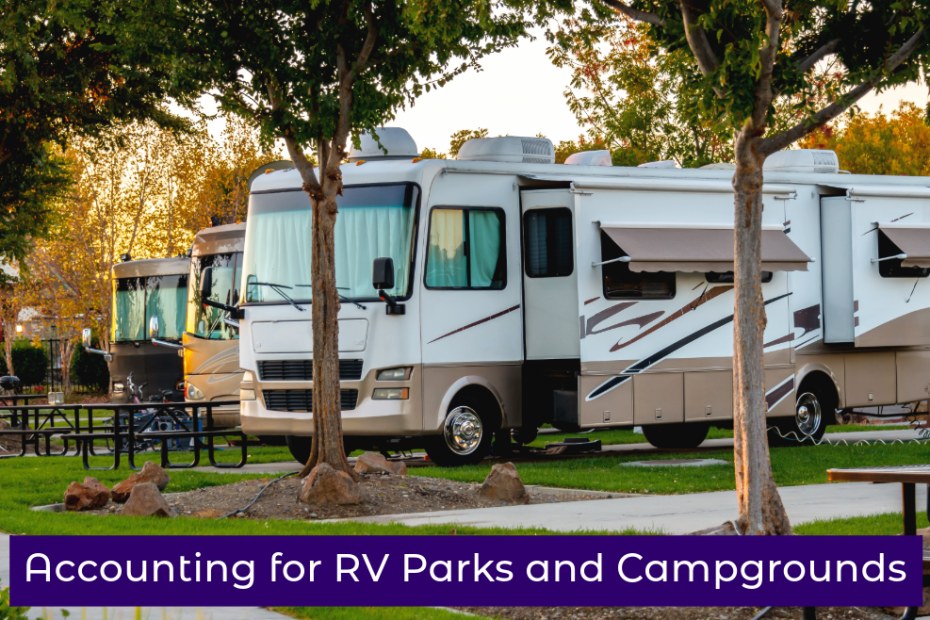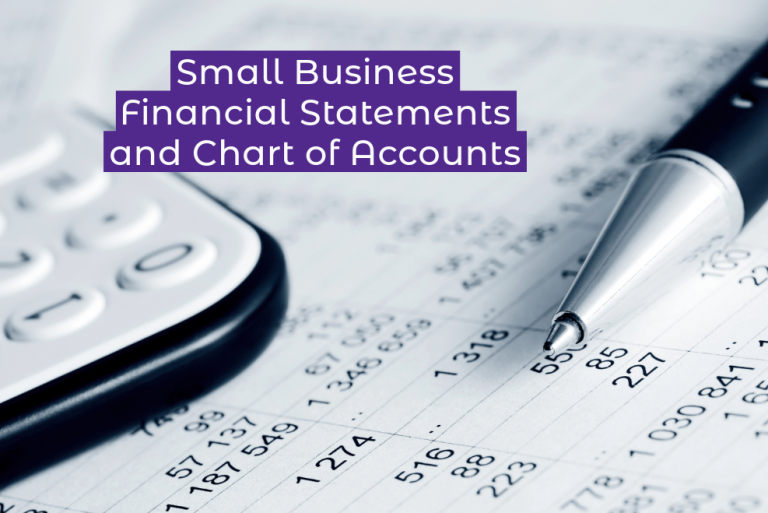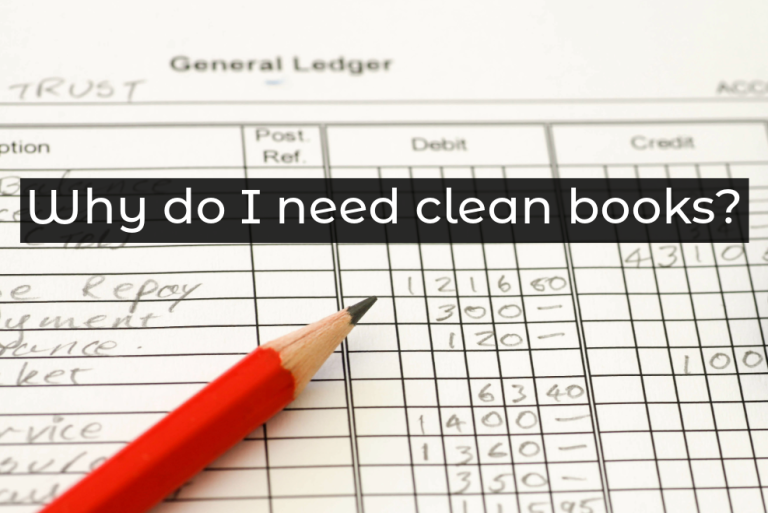You own a place where people go to get away from it all, but for you, as the owner of an RV park or campground, that same beautiful place can still be a source of headaches and frustration. Campground owners wear many hats and it can often seem like there is no down time, even when you do have hired help as well as volunteer camp hosts. There are not enough hours in the day to operate your business, work on building it into something even better, keep up with the “back office” type stuff, give excellent customer service, and put out the fires that flare up on a daily basis.
One of the most common things that small business owners stress about is their financials. Even if you’re running an RV park that is successful and has no problem bringing in a great income for you and your family, you still might struggle with your accounting duties. Does any of this sound like you?
- You’re unsure of how to record transactions so the (incorrect) data just confuses you.
- You don’t understand how to interpret financial statements like a P&L, so the data – even if it’s correct – doesn’t help you run your business.
- You have a hard time managing your cash flow with all the peaks and valleys of running a seasonal-ish business.
- You can’t find the time to dedicate to keeping your books, so you don’t do it at all.
Not to worry! In this article, we will dig into a few of the biggest pain points for RV park and campground owners with the aim of helping you understand a few accounting concepts a little better. And if push comes to shove and you’d rather outsource your campground bookkeeping, I can help you there, too.
Dive Deeper Into Your RV Park’s Income and Expenses
The very foundation of keeping your books is tracking your income and expenses. You might have just one bucket to fill with all your income streams, and maybe you have a few different buckets for expenses since that’s how it has to be done at tax time. However, I’m here to tell you there’s a better way that will give you more meaningful information about your business.
First, you need to have a bucket for EACH of your different sources of income. You can have sub-buckets also (okay, that analogy only goes so far!). The income section on your Chart of Accounts might look like this:
- Accommodation income
- Short-term RV sites
- Full hookups
- Water only
- Long-term RV sites
- Cabin 1
- Cabin 2
- Tent sites
- Short-term RV sites
- Commissary income
- Food sales
- Laundry income
- Upgrade and fee income
- Extra person fees
- Late check-in
- Late check-out
- Linen rental income
- Wifi fees
Your business will have more (I’m looking at you, owners who offer dog grooming, RV washing, and mini-golf!) or fewer than these (those owners with more basic amenities), but consider how much just this info can give you. If you run a Profit and Loss report with multiple months or quarters on it, you can see what your sales are in each category as well as how they fluctuate over time. A Florida RV park will likely have more long-term guests in the winter months; cabin income might surge during summer when it’s incredibly hot out and fewer people want to tent camp. Tent camping in fall and spring may be higher than winter and summer, unless you own a waterfront property, where summer likely will be your peak period.
Let’s turn to your expenses. You will want to set everything up in a similar fashion. Here are some common expenses that should be broken out so you can get the best data possible from your RV park or campground financial statements (some of these would be operating expenses and some would be overhead, this is just a general list off the top of my head):
- Utilities
- Electric
- Gas
- Sewer
- Telephone
- Trash
- Water
- Wifi
- Laundry expenses
- Repairs and maintenance
- RV sites
- Ground
- Utilities
- Amenities
- Camp sites
- Ground
- Amenities
- Laundry facility
- Washers
- Dryers
- Building
- Common areas and grounds
- Lawn and landscaping
- Hardscapes
- Gate/access control
- RV sites
- Professional fees
- Advertising
- Office supplies
- Small tools and equipment
- Dues and subscriptions
- Wages
- Payroll expenses
- Insurance
Of course, you may not have all of these and you may even choose to categorize them differently – as the owner of your RV park or campground, you are in charge! Whatever makes sense to you is how it should be set up. If you have a commissary or camp shop, you’d also want to divide out a separate set of COGS accounts and keep track of inventory.
In addition, you will almost certainly have depreciation expenses for your property improvements, even if the property itself most likely cannot be depreciated as land is not depreciable. Your upgrades such as water lines, electric poles and meters, the dump station, a pavilion you built for events and community dining, the commissary, laundry, bath house, cabins…the list goes on. Any equipment such as washers and dryers, kitchen equipment, your gate/entry system, an extensive wifi system, etc. also should be depreciated over a reasonable period of useful life. These represent what we call non-cash expenses and they simply decrease your income for tax purposes until they have been fully depreciated.

Rely on Good Data Via Financial Statements
Now that you have a better understanding of how to properly categorize your regularly occurring transactions, you can be better assured that the data you have is reliable. That Profit and Loss Statement (P&L) will probably make a little more sense now!
Income Statement
You’ll want to run a P&L (technically known as the Income Statement) once a month to reflect on how your business did for that month. This particular financial statement can give you quite a lot of insight into how your business is doing. You can view how each stream of income is doing, and if your expenses are holding steady.
You can run this report from QuickBooks to view everything month over month, allowing you to spot seasonal trends. Year-over-year reports can give you insight into inflationary trends as well as if a new business strategy is working out.
Balance Sheet
The other report you really want to be aware of is the Balance Sheet. This gives you a picture of your business at a given point of time (a single snapshot versus a period of time like the P&L). Your assets are listed at the top, which includes cash, accounts receivable if you have it, any inventory, your campground property, and prepaid expenses like your annual insurance premium if you paid it in full.
Your liabilities come next and this includes all loans or credit you have taken out such as with a vendor (A/P), credit cards, or notes payable (like a mortgage on your property), as well as unearned income from customer prepayments. This section also includes sales and lodging taxes you collect but have not yet remitted; these are commonly misclassified as expenses but they are not!
Lastly is owner’s equity and this is the net of your assets and liabilities, showing how much you as the owner truly own. The amount here gives your business a value beyond just whatever your profits are (and this is where your profits get added in at year-end).
So, when I say that you need good data to make good business decisions, I’m referring to being able to use these reports to guide your path. If the data you input is incorrect, incomplete, or not kept up with, you cannot rely on the reports and will have a harder time making correct decisions. For example, you can’t see revenue trends if you haven’t recorded your sales in three months or you’re only seeing the ACH deposits from your credit card processor!
Better Manage the Cash Flow for Your Campground
With a business that is at least somewhat seasonal depending on your location, it can be difficult to manage your cash flow. You may have heard of a financial statement called Statement of Cash Flows, but I don’t find this particularly useful for small businesses. A report you might find more useful is a forecast. We will get to that in just a second, but first let’s review a few things you can do to help pick up some extra income in those times of lean.
Strategies for Increasing Campground Revenue
Say if your RV park is located in Florida in an area that is not particularly exceptional as far as view, scenery, or location, you will have to get a little creative with how to entice people to come and spend money during the off-season. One idea is to host events that attract non-campers. If you have a pole barn or some kind of pavilion that is not in an area where it will disturb guests to have events, you might consider advertising on wedding sites for hosting small receptions and bridal showers. You can offer cabins or tent sites to guests as a package deal (and this is a perfect way to reduce the risk of drinking and driving!).
There are tons of events you could host depending on the layout of your campground, how far you are from town, what type of amenities you offer, and if you have a view. Consider these:
- weekly or monthly farmer’s market
- celebrations for anniversaries, engagements, birthdays
- flower picking and/or photography venue (e.g., plant a field of sunflowers or zinnia)
- holiday events
- monthly farm-to-table dinner with a chef
- weekly cornhole tournaments
- building a full restaurant on site
- offering memberships such as a pool membership to locals during the Florida summer slump
A commissary or camp store is a good investment that can help increase your income year-round if you stock it with the right things. Prepackaged snacks and cold drinks are always a great idea, but consider what else your guests might need without having to trek into town (supply hoses for RVs, charcoal and firewood, towels and RV linens, tarps for leaky tents, bungees and ropes, lanterns, silverware…the list could go on and on!).
A last idea is to consider raising prices and making your bookings all-inclusive. You can certainly make money off a coin laundry, but having a laundry room available free of charge to all guests will aid in giving your RV park a premium feel. Same goes for free fast wifi, contactless check-in, and a breakfast buffet on weekends. Capital improvements should be depreciated if they are over $2500 and have a useful life of two years or longer – think building a pavilion, setting up a laundry with multiple washers and dryers, or installing a massive wifi system for top-notch reception. You can expense the smaller stuff.
Using Budgets and Forecasts
QuickBooks Online Advanced makes it really easy to generate forecasts from your existing data. You can select a percentage by which to increase or decrease your historical income and expenses so you can view a reasonable estimation of what your income and expenses would be. You can also do a Budget vs. Actual Report, and this is super helpful when you want to see if you’re hitting your goals. These reports should be run every month alongside your normal P&L for the best information you can get about your small business financials!
Establish a Routine to Ensure Your Books Are Accurate and Complete
The best thing you can do is to create good habits surrounding your bookkeeping. This involves keeping a digital paper trail of receipts, invoices, etc., setting aside some time each week to enter things and categorize your transactions, and reconciling EACH account monthly (all bank accounts, all credit cards, and ensuring that loan payments are entered correctly).
Within QuickBooks online, you can upload a copy of any documents that back up the transaction you’re entering. There is a certain flow for invoicing and paying bills and making deposits so that everything is tracked and connected correctly.
Another thing you can do is utilize bank feeds. This is where you login to your bank(s) through QuickBooks and it will automatically poll your bank transactions and take a guess at what bills and whatnot these might match up with. You can then go through and give everything a look and confirm that they match or fix the ones that don’t. You can even set up rules to help things get matched up correctly, saving a lot of time!
Reconciling each account each month is equally important and is a breeze when you have your bank feeds connected and synced. You can likewise upload a copy of your bank statement as part of that digital paper trail I mentioned.
All of this is imperative to getting those financial statements to be effective tools for you to use in your business. It takes some time to get everything organized and develop a routine to get things done, and I don’t blame you if it feels overwhelming and like you are already swamped with other things on your plate. You can always outsource this if you feel like you’d rather hand this off to someone else!
This is important for tax time, too. Getting ready for tax time is secondary to having that data for use in your operations, but keeping clean books does massively help for tax prep, too. You or your bookkeeper can have everything ready for your tax preparer, which saves you some money on that end as well since your CPA is not having to play catchup with your books during their busiest season.
Establishing an accounting and bookkeeping system for your RV park or campground will benefit your business greatly since it helps you stay organized, gives you solid data for use in making informed business decisions, and it keeps things streamlined for tax time. If you want to discuss how I can help you get your books set up for your small business or how you can outsource it all to me, schedule a call and we can talk some more!



